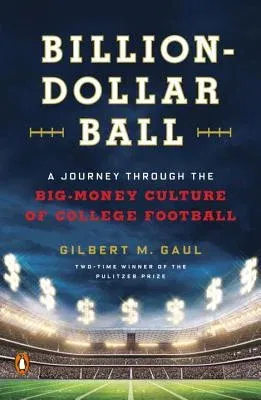**"A penetrating examination of how the elite college football programs
have become 'giant entertainment businesses that happened to do a little
education on the side.'"--Mark Kram, The New York Times
Two-time Pulitzer-Prize-winning journalist Gilbert M. Gaul offers a
riveting and sometimes shocking look inside the money culture of college
football and how it has come to dominate a surprising number of colleges
and universities.
Over the past decade college football has not only doubled in size, but
its elite programs have become a $2.5-billion-a-year entertainment
business, with lavishly paid coaches, lucrative television deals, and
corporate sponsors eager to slap their logos on everything from
scoreboards to footballs and uniforms. Profit margins among the top
football schools range from 60% to 75%--results that dwarf those of such
high-profile companies as Apple, Facebook, and Microsoft--yet thanks to
the support of their football-mad representatives in Congress, teams
aren't required to pay taxes. In most cases, those windfalls are not
passed on to the universities themselves, but flow directly back into
their athletic departments.
College presidents have been unwilling or powerless to stop a system
that has spawned a wildly profligate infrastructure of coaches,
trainers, marketing gurus, and a growing cadre of bureaucrats whose sole
purpose is to ensure that players remain academically eligible to play.
From the University of Oregon's lavish $42 million academic center for
athletes to Alabama coach Nick Saban's $7 million paycheck--ten times
what the school pays its president, and 70 times what a full-time
professor there earns--Gaul examines in depth the extraordinary
financial model that supports college football and the effect it has had
not only on other athletic programs but on academic ones as well.
What are the consequences when college football coaches are the highest
paid public employees in over half the states in an economically
troubled country, or when football players at some schools receive ten
times the amount of scholarship awards that academically gifted students
do? Billion-Dollar Ball considers these and many other issues in a
compelling account of how an astonishingly wealthy sports franchise has
begun to reframe campus values and distort the fundamental academic
mission of our universities.

